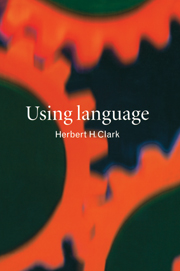13 - Conclusion
Published online by Cambridge University Press: 05 June 2012
Summary
People use language for doing things with each other, and their use of language is itself a joint action. Much of this book has been devoted to these two points. In the course of this examination, I have made three broad arguments. One is that people use language only within broader joint activities. Another is that communicative acts divide into levels, tracks, and layers. And a third is that the very notion of language itself needs to be expanded if we are to account for language use. In this chapter I take a final look at these arguments.
Social action
Language is rarely used as an end in itself. It is primarily an instrument for carrying out broader activities – buying goods, planning parties, playing games, gossiping, exchanging stories, entertaining and being entertained. All of these are joint activities in which two or more people, in socially defined roles, carry out individual actions as parts of larger enterprises. Language is simply a device by which they coordinate those individual actions. When I buy a bottle of shampoo in the drugstore – a joint activity – among other things I talk to the clerk. But if I were asked, “What did you do in the drugstore?” I wouldn't say, “I talked to the clerk,” even though I did. I would reply, “I bought some shampoo,” which describes the larger enterprise. Using language was only a means to that end.
We cannot study language use without studying joint activities, and vice versa. People cannot carry out joint activities without signaling each other, nor do they ordinarily signal each other except in the course of joint activities.
- Type
- Chapter
- Information
- Using Language , pp. 387 - 392Publisher: Cambridge University PressPrint publication year: 1996

